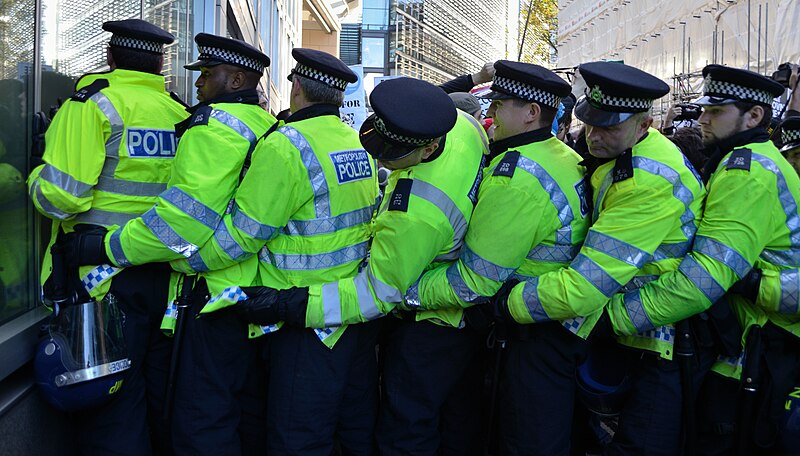
A heavy security presence has been deployed around a luxury four-star hotel in London’s Canary Wharf after two consecutive nights of heated anti-immigration protests.
Metal barriers and fencing were erected outside the Britannia International Hotel on Thursday morning, following demonstrations sparked by the government’s decision to convert the venue into accommodation for asylum seekers. The hotel, where rooms can cost up to £425 per night, is the latest in a string of high-profile buildings being used to house migrants amid growing public backlash.
Security guards in black uniforms and face masks stood watch behind the new perimeter as workers were seen delivering beds and mattresses to the site. Police remain on high alert over the possibility of further protests over the weekend.
Tensions have also flared elsewhere in the UK. In Epping, Essex, fresh demonstrations are expected after violent scenes outside The Bell Hotel, which has also been repurposed to house migrants. Clashes erupted earlier this month after an Ethiopian asylum seeker staying at the hotel was charged with sexually assaulting schoolgirls, igniting local outrage.
The unrest has since spread. More than 150 protesters gathered on Monday outside The Park Hotel in Diss, Norfolk, after the Home Office announced a shift from housing families to accommodating single male asylum seekers.
Police and metal fencing were in place outside the Canary Wharf hotel as protesters, some masked and others draped in St George’s flags, clashed with officers earlier this week. Anti-migrant activists claim the barriers were installed to prevent them from approaching the hotel entrance.
Warning signs of escalation
Tiff Lynch, Chair of the Police Federation, warned that the disorder in Essex could be a "signal flare" for wider unrest. She said overstretched police forces may be unable to maintain control if protests continue to erupt across the country throughout the summer.
"Local commanders are once again being forced to choose between keeping the peace at home or plugging national gaps," Lynch wrote in The Telegraph. “It would be dangerous to assume that police can hold the line indefinitely.”
Political fallout
The use of the Britannia Hotel has drawn sharp criticism from politicians and residents. Shadow Home Secretary Chris Philp slammed the government for spending public money on what he described as “luxury” accommodation for migrants.
“It is outrageous that taxpayers are footing the bill for illegal immigrants to stay in four-star hotels in the heart of London’s financial district,” he told The Sun. “This is an insult to law-abiding citizens.”
Local businesses and residents echoed the concern, with some saying the move has disrupted the community and raised fears over safety. The Tower Hamlets Council confirmed that the government intends to use the hotel — which has around 500 rooms — to house asylum seekers. Some hotel guests have reported that their bookings were cancelled to make way for migrant arrivals.
Protesters had believed that migrants were being transferred from Epping to Canary Wharf, though the Home Office later clarified this was not the case.
Controversy in Essex
In Epping, the fallout from earlier protests continues. Essex Police have issued dispersal orders in anticipation of more demonstrations, after earlier protests saw bricks and flares hurled at police vans outside The Bell Hotel.
Chief Constable Ben-Julian Harrington rejected calls to resign following accusations of partiality, including claims that officers had escorted pro-migrant activists to the protest site. Footage showed police walking with the group from a nearby train station to the hotel, sparking criticism from Reform UK leader Nigel Farage, who described it as “absolutely disgraceful.”
Police initially denied escorting the group, but later admitted to forming a “foot cordon” for their safety. Harrington firmly denied that any preferential treatment was given.
“Our officers are there to protect everyone—residents, protesters, and those living in asylum accommodation,” he said at a press conference. “We intervened where there was disorder, not based on ideology.”
He also dismissed claims that activists were “bussed in” by police, stating that individuals arrived on their own and were only transported away when their safety was at risk. Photo by DulcieLee, Wikimedia commons.




































